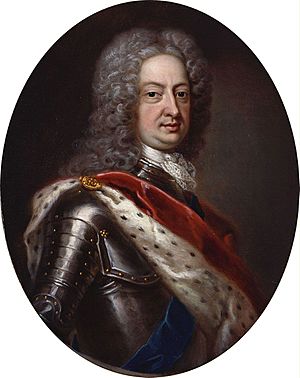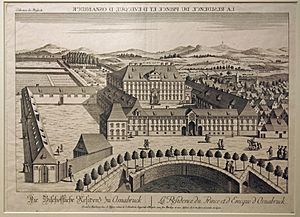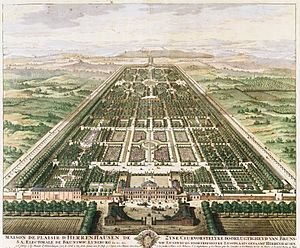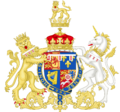Ernest Augustus, Duke of York and Albany facts for kids
Quick facts for kids Ernest Augustus |
|
|---|---|
| Duke of York and Albany | |
 |
|
| Born | 17 September 1674 Osnabrück, Germany |
| Died | 14 August 1728 (aged 53) Osnabrück, Germany |
| House | Hanover |
| Father | Ernest Augustus, Elector of Brunswick-Lüneburg |
| Mother | Sophia of the Palatinate |
Ernest Augustus, Duke of York and Albany (born September 17, 1674 – died August 14, 1728), was a prince from Germany. He was the younger brother of George I of Great Britain, who later became King of Great Britain. Ernest Augustus was a brave soldier who fought in important wars. Later in his life, he became a special kind of religious leader and ruler called the Prince-Bishop of Osnabrück.
Contents
Early Life and Education
Ernest Augustus was born on September 17, 1674. He was the sixth son and seventh child of Ernest Augustus, Elector of Brunswick-Lüneburg, and Sophia of the Palatinate. He was also the youngest brother of the future King George I.
For the first five years of his life, Ernest Augustus lived in Osnabrück, Germany. His father was the Prince-Bishop of Osnabrück at that time. Later, his family moved to Hanover when his father became the Duke of Brunswick-Lüneburg.
Like many young princes of his time, Ernest Augustus traveled to other countries. This was to meet important people and learn about diplomacy. In 1687, he visited the French royal court at Versailles. He and his brother were well-liked by the French royal family during their visit.
A Soldier's Career
After his travels, Ernest Augustus became a soldier. This was a common path for young German princes. His family supported Emperor Leopold I, so Ernest Augustus fought against the French. He took part in the Nine Years' War and was at the Battle of Neerwinden in 1693.
He continued his military service during the War of the Spanish Succession. He was actively involved in the Siege of Lille (1708), an important battle.
When his father passed away, his older brother George inherited all the family lands and titles. This was because their father had changed the rules so that only the oldest son would inherit everything. Unlike some of his other brothers, Ernest Augustus agreed with this change. Because of this, he and George got along very well, and George trusted him.
Ernest Augustus was an important person at his brother's court in Herrenhausen. He met with foreign visitors and helped with the court's cultural activities. He might have even helped the famous composer Handel get a job there.
An Important Family Role

When his brother George became King of Great Britain and moved to London, Ernest Augustus took on a big role in Germany. He became the main leader of the family in Brunswick-Lüneburg. He was like a regent, meaning he managed things for the family. He also took care of George's seven-year-old grandson, Frederick Lewis. Frederick later became the Prince of Wales and the father of King George III. Frederick stayed in Germany to show that the family was still committed to their German lands.
In 1715, Ernest Augustus became the Prince-Bishop of Osnabrück. This position was special because it had to switch between Catholic and Protestant rulers. This was part of an old agreement called the Treaty of Westphalia. When it was a Protestant's turn, a member of Ernest Augustus's family usually got the job. Since his older brother had become Catholic, King George nominated Ernest Augustus. This job was very important, so Ernest Augustus had to spend his time between Schloss Osnabrück and the court at Herrenhausen.
In 1716, Ernest Augustus visited England. While there, he was given important British titles. On June 29, 1716, he became the Duke of York and Albany and the Earl of Ulster. Later, on April 30, 1718, he became a Knight of the Garter. This was a very high honor.
His Final Years
After his visit to Great Britain, Ernest Augustus returned to his life in Germany. He continued to divide his time between Schloss Osnabrück and the court at Herrenhausen. He actively managed the affairs of both places.
He passed away in Osnabrück on August 14, 1728, and was buried there. His brother, King George I, had also died in Osnabrück just one year earlier during a journey. Ernest Augustus never married. When he died, his British and Irish titles ended.
Images for kids
 | Valerie Thomas |
 | Frederick McKinley Jones |
 | George Edward Alcorn Jr. |
 | Thomas Mensah |



